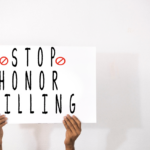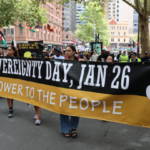Do AVOs Protect Domestic Violence Victims?

Last week, yet another woman died a violent death in Australia. Sharon Michelutti is the fourth woman recorded by Destroy the Joint in their Counting Dead Women 2016 project, which reports deaths resulting from violence against women. The count for 2015 ended at a staggering 79 deaths. Most of those women died at the hands of their current or former partners.
According to the Australian Institute of Criminology,
“one in three Australian women experience domestic violence at some point during their adult life and it is women and their children who typically suffer the most severe short and long-term consequences of this violence.”
Like many other women who are killed, Ms Michelutti had a protection order in place at the time of her death. In fact, police had taken out several apprehended violence orders (AVOs) out against Ms Michelutti’s partner since 1999.
The continuing deaths have sparked debate about how effective AVOs are in preventing violence against partners.
Cycle of Abuse
Last year’s Australian of the Year, Rosie Batty, had a protection order in place at the time her son Luke was killed by his father, Greg Anderson. The Coronial Inquest into Luke’s death found that the orders themselves are helpful, but that there can be general confusion about how they operate.
In his findings, State Coroner Judge Gray acknowledged that prior to Luke’s murder, the courts expressed grave concerns about Luke having contact with his father. The magistrate had issued a ‘no contact’ order that applied to both Ms Batty and her son, even though Mr Anderson had never been violent towards Luke.
The magistrate noted the dilemma faced by Ms Batty – trying to remain safe while at the same time wanting to promote a healthy relationship between Luke and his father.
Ms Batty told the Inquest, “I wanted someone that could step in and stand up to [Mr Anderson] and say — where he could take out his blame and hatred on somebody else and not just me all the time.”
It is clear from the tragic circumstances of Luke’s death, and those of many others, that it is impossible to predict an abuser’s behavioural patterns.
It is clear, however, that abusers frequently repeat and escalate their abusive conduct. The NSW Bureau of Crime Statistics and Research (BOCSAR) released a study in September 2015 which highlighted the reoccurring nature of abuse:
“The study of the criminal histories of 250 offenders who were imprisoned for [Apprehended Domestic Violence Order (ADVO)] breaches revealed nearly half of them had been to court at least five times in the previous five years. Almost 75 per cent had already been convicted of a domestic violence offence, and a further two-thirds had breached a protection order.”
Effectiveness
At the same time, the BOCSAR study suggested that 98 per cent of women reported that they stopped experiencing domestic violence after taking out an apprehended domestic violence order (ADVO).
The study found that when protection orders are properly understood and breaches are reported and acted upon, they can be highly effective. In NSW, AVOs are relatively easy to obtain, as they do not require proof of actual violence and the test for obtaining AVOs is ‘on the balance of probabilities’, not the criminal test of ‘beyond reasonable doubt’.
For AVOs to serve their purpose, breaches must be reported and acted upon. Those who work with victims say that women often find it difficult to summon the courage to make a complaint in the first place, and often have even more difficulty reporting breaches. And then there’s the question of enforcement.
In its submission to the Victorian Royal Commission into Family Violence, the Darebin Community Legal Centre (CLC) noted that:
“The value of an intervention order is only as good as the protected person’s willingness to report breaches and the police’s capacity and willingness to enforce the order.”
Darebin CLC reported that its clients regularly complain to duty lawyers about police not prosecuting breaches of AVOs, particularly where the breaches involve emails, phone calls, or text messages, rather than physical violence.
The CLC expressed concern that police tend to evaluate the content of prohibited contact and try to assess the risk of harm, rather than act on the breaches themselves, which are subject to serious penalties.
Speaking about these concerns with the Sydney Morning Herald, Tanya Whitehouse from the Women’s Domestic Violence Court Advocacy Service program said she has observed the same issues with reporting breaches.
“Women have a fear of what will happen if they do the report. It’s a very difficult thing to have the courage to tell police initially, let alone to keep reporting,” she said.
“It might be she got a phone call and he’s not supposed to ring her and she doesn’t want to report it.
“By not reporting it there is a possibility of it escalating.”
Domestic violence is very rarely a one-time occurrence. A protection order is an important step for any woman looking to protect themselves and their children, but orders need to be enforced to be effective. Failure to comply with a protection order shows a lack of respect for the complainant and the criminal justice system. Victims’ groups are of the view that no breach should ever be tolerated.
False Complaints
On the other side of the coin, the ease of obtaining AVOs in NSW can open the door for aggrieved former partners to use them as a mechanism of control – fabricating claims to bolster family law proceedings, and causing injustice to innocent defendants in the process.
The unfairness is compounded when false claims of breaches are made to police, potentially leading to criminal charges being brought against those who have done nothing wrong in the first place.
With so much at stake, one hopes that police and magistrates will exercise care great and sound judgment when making decisions about AVOs, regardless of the genetic characteristics of those they are dealing with.






